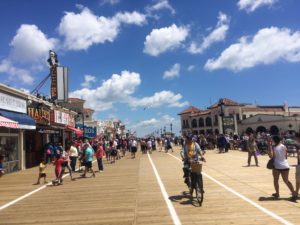
It was called the Syringe Tide, and in the late 1980s, it drained an estimated $1 billion in revenue from New Jersey beach communities.
Ed Pohlman remembers that time, when medical waste, raw sewage and hypodermic needles washed up along the shoreline, driving vacationers away from New Jersey and costing businesses dearly. The owner of two Ed’s Funcade locations in Wildwood has seen a lot during his 45 years of business ownership at the Shore, but not even the toxic flotilla that invaded Jersey in 1987 and ’88 could top what happened last summer, when the coronavirus pandemic forced businesses to close down or operate with limited capacity and prevented patrons from visiting the usual stops on their summer vacations.
“We’ve been through ups and downs, but we’ve never experienced something like this,” he says. “It’s monumental.”
Last year, everything was closed until July 2, and when there was a re-opening, businesses and their customers were forced to practice social distancing and wear masks, while still trying to find some enjoyment during a frightening, surreal time. Pohlman reports that his business was cut in half from the previous year, and other proprietors experienced similar drops in revenues.
“It was like being thrown into a washing machine on the spin cycle with a blindfold on,” says Patrick Rosenello, Executive Director of the Wildwoods Boardwalk Special Improvement District and owner/operator of three restaurants in the town. “Every day, we woke up not knowing what the day would bring. Without a doubt, it was the most difficult season I’ve ever experienced, and I’ve done this for almost 25 years.”

There were plenty of challenges last year, and they forced business owners to be as creative as possible with their approaches. For instance, Johnson’s Popcorn, which has three stores along the Ocean City boardwalk, increased its mail-order business considerably to make up for a shortfall in walk-in traffic. As a result, despite decreased sales, the totals were “expected and accepted,” according to Becky Juzwiak, vice president of the company.
“People were sending memories of the shore to friends and family who had canceled vacations or couldn’t make it to the shore,” Juzwiak says.
After such a difficult 2020 season, owners of restaurants on the Wildwood and Ocean City boardwalks are hoping there will be a significant rebound in ’21. The promising combination of growing vaccine totals and a lessening of government restrictions should send visitors streaming back to the Jersey Shore. With that will come a desire to eat out, engage in entertainment opportunities and shop in the boutiques and stores that have been part of the beachfront experience for decades.
Business owners expect people to remain cautious but nonetheless eager to get out and spend money again, thereby helping them through the three-plus month season that for many is their only revenue of the year. In late May, when New Jersey Governor Phil Murphy lifted the state’s indoor mask mandate and said people no longer had to remain six feet apart, it was a starter’s pistol for business owners, who expected Memorial Day weekend to be a gateway for the return to normalcy.
“It feels to me that the answer is yes, we are coming back,” Rosenello says. “There will be a percentage of people who are never going to feel comfortable again in indoor retail settings, but a large percentage of people understand things better and have been vaccinated.
“I think there will be a dramatic return to normalcy.”
When Juzwiak thinks ABOUT the staffing problems that lie ahead for Johnson’s Popcorn this summer, she gets upset.
“I lose sleep at night because of that,” she says. “We have a major staffing crisis. It’s a circus. In 20 years, it has never been this difficult to find employees.”

There are a couple of different factors in the trouble. The first is the all but shutting off of the stream of J-1 visas, which allow students from abroad to visit the Jersey Shore during the summer and work at businesses up and down the coast. According to Pete Riess, who has been affiliated with Mack’s Pizza in Wildwood “off and on for 42 years” and is now the manager of the Wildwood Avenue restaurant, young people from other countries “make up half or a little a little more of our core group of employees.”
Without the foreign workers, getting the restaurants—and just about any business at the shore—up to full staffing will be impossible. Pohlman says that even if the J-1 workers can get to the U.S., there will be quite a competition for their services. Businesses will be giving out signing bonuses (he provides stipends at the end of the year to workers who show up regularly) and providing wages that could approach $20/hour.
The J-1 issue isn’t the only reason it has been difficult to find staff.
“The list of reasons why there is an employment crisis would have quite a few bullet points,” Juzwiak says.
One of those near the top would be the unwillingness of young American workers to rejoin the labor force, thanks to the $600 in weekly unemployment benefits they have been receiving. Even if they were to get $15/hour to work, that would add up to $600 a week, on which they would have to pay taxes. Plus, they would have to work, rather than stay at home. Add in the trepidation of some parents who don’t want their teenagers working, even at the tail end of a pandemic, and there is quite a difficult situation.
“Employers are getting creative,” says Tracey DuFault, executive director of the Greater Wildwood Chamber of Commerce. “Wawa stores are offering signing bonuses of $500. Morey’s is telling workers that if they work so many shifts, they will get season passes to their water parks and rides for them and their families.”
Business owners and operators will have to get creative if the shortage continues throughout the summer. Riess says Mack’s Wildwood Avenue location, which seats 75 in a first-floor dining area and the same amount upstairs, may not be able to open at full capacity. Juzwiak is taking a Zen-like approach, preaching patience to both workers and customers. That way, there won’t be frustrated people waiting for a chance to purchase something or overwhelmed staff trying to keep pace.
“You’re going to get your popcorn,” she says. “It may take one-and-a-half minutes, instead of one. Everybody’s on vacation. Everybody’s in a good mood, generally.”
Happiness should be abundant this year, as visitors revel in a more authentic shore experience, and those hoping to make good livings look forward to fewer (and perhaps no) restrictions. The local chambers are certainly doing what they can. Michele Gillian, Executive Director of the Ocean City Regional Chamber of Commerce, predicts “a magical summer” and says administrators are committed to making visitors feel as comfortable as possible while they are out and about, and plan to move ahead with entertainment in the city and on the boardwalk to boost traffic. DuFault says Wildwood will also host its annual events, and praises the creativity of business owners and local government in coming up with ways to help bring customers to shops. Strong rental numbers are indicative of a town ready to bounce back.
“It’s very positive at this point,” DuFault says. “The numbers are much higher than last year when people made last-minute decisions to come here on vacation. This year, there’s more planning.”
There are no guarantees that business owners’ coffers will fill to 2019 levels, but the momentum is there, and there is reason for hope. Although obstacles remain, by Labor Day it’s likely the nightmare of 2020 for boardwalk business owners will have largely receded, thanks to a profitable ’21 season.
“Up and down the boardwalk, people are working so hard,” Juzwiak says. “The people have been preparing tirelessly, and everybody is so excited to have people come down the shore. We’re in a good spot. There are going to be some little problems, but we’re all in this together.”
And hoping to reverse the tide.

